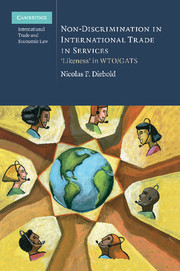Book contents
- Frontmatter
- Contents
- Foreword
- Acknowledgements
- Abbreviations
- List of Cases
- List of Legal Texts
- List of Documents
- Introduction
- PART I Foundations
- PART II Framing the conceptual breadth of ‘likeness’ in GATS
- PART III GATS specific ‘likeness’ issues
- PART IV Methodology for the ‘likeness’ analysis in GATS
- 13 The border tax adjustments framework
- 14 Applying market definition theories to ‘likeness’
- 15 The PPM-problem in the GATS ‘likeness’ context
- 16 Concluding summary: substitutability framework
- Summary of conclusions
- Bibliography
- Index
15 - The PPM-problem in the GATS ‘likeness’ context
Published online by Cambridge University Press: 10 January 2011
- Frontmatter
- Contents
- Foreword
- Acknowledgements
- Abbreviations
- List of Cases
- List of Legal Texts
- List of Documents
- Introduction
- PART I Foundations
- PART II Framing the conceptual breadth of ‘likeness’ in GATS
- PART III GATS specific ‘likeness’ issues
- PART IV Methodology for the ‘likeness’ analysis in GATS
- 13 The border tax adjustments framework
- 14 Applying market definition theories to ‘likeness’
- 15 The PPM-problem in the GATS ‘likeness’ context
- 16 Concluding summary: substitutability framework
- Summary of conclusions
- Bibliography
- Index
Summary
The issue of ‘process and production methods’ (PPM) in the context of international trade is highly nuanced and evokes a number of general policy questions about the role of the WTO in fields such as environment and human rights on the one hand, as well as many very technical legal questions in the application of WTO law on the other hand. The core issue at the centre of the product–process debate essentially relates to the question whether Members should be allowed under their WTO obligations to distinguish between products on the basis of the production method. More specifically, could a Member treat a foreign product subject to a low PPM-standard less favourably than domestic products that are processed and produced in accordance with higher standards?
A true PPM-measure pursues primarily policy goals unrelated to trade. Most of the time, the measure is aimed at subjects such as labour standards, human rights, environmental protection or animal welfare. Governments pursue these objectives with different types of measures, many of which affect international trade and are potentially discriminatory. At the outset it is important to distinguish between origin-based and explicitly PPM-based differential treatment. For instance, a measure can prohibit all seal fur imports from Canada because some Canadian hunters kill seals in a cruel way (origin-based but PPM-motivated measure) or it can generally prohibit the sale of seal fur if the seals are killed cruelly (explicit PPM- measure).
- Type
- Chapter
- Information
- Non-Discrimination in International Trade in Services‘Likeness' in WTO/GATS, pp. 339 - 348Publisher: Cambridge University PressPrint publication year: 2010



